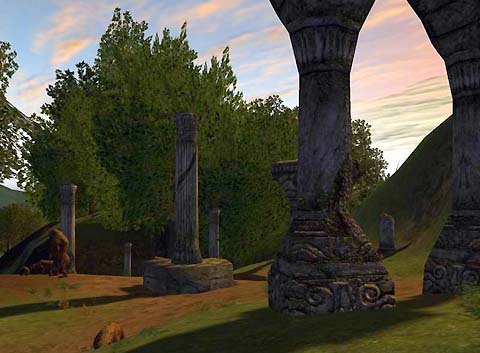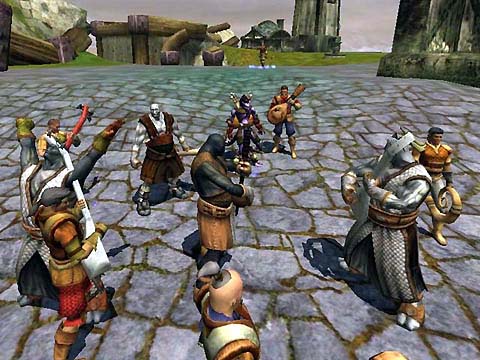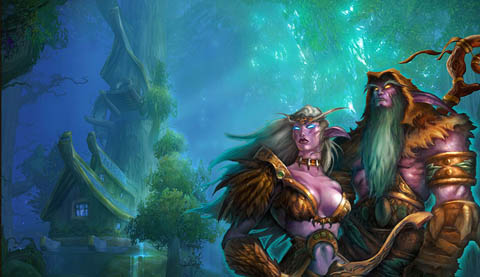|
Not
With a Bang but a Whimper
by Clive Thompson on 19 December 2005 in Wired
Magazine
"Anybody
out there?" I type, but I already know it's pointless. There's nobody
anywhere near me. For almost an hour, I've been wandering around a
desolate plain: Gray clouds scud slowly over rough quartz mountains,
while a few birds wheel in the air near mushroom-shaped trees. I never
see another living soul. It feels like the end of the world.
And in fact, it is. I'm inside Asheron's Call 2, an online game that is
scheduled to die in two weeks. It never acquired enough players to make
it self-sufficient, so the game's owner -- Turbine -- is going to do
something that only happens rarely in the world of online play: On Dec.
30, it'll flip the power off on the remaining servers, and an entire
world will blink out of existence.
This got me
wondering: How do people behave in a world where the end is actually
nigh? Sci-fi aficionados, Cold War moviemakers and Christian
apocalyptics have mused over this for years, since they've assumed that
the end of life would have a catalytic effect on the human spirit. In
nuclear-war or alien-invasion films like The Day After or War of the
Worlds, catastrophic attacks turn America into a landscape of venal
looting and family togetherness -- our best impulses mixed with our
worst.
But after talking to several longtime players of Asheron's Call 2, I've
realized the end of a game world is less cataclysmic -- and more
subtle. The players aren't dying in real life; they're just being
forced to disband. Their emotional state is thus more like the grief of
an indigenous tribe that is being driven off its land by a
megacorporation and is losing its way of life. It's kind of like the
villagers at the end of Fiddler on the Roof, forced by the czar to
abandon their homes and scatter to the four winds.
"It's really heart-wrenching. How will you connect with those people
you spent every single day with? It's as though someone suddenly took
away all e-mail," as one player who calls herself "Ellen Ripley" online
told me. "Suddenly they seem nameless and ethereal, where once they
were as real and important as our families, co-workers and Earth-realm
friends."
Online worlds are, of course, more than just playlands for slaughtering
ogres and collecting magic chain mail. They're social hangouts where
players sit around shooting the breeze about their lives, their jobs,
their favorite music. "That gives one an odd sense of home. And no one
likes to see their homes be demolished," said Chris Thorn, a
26-year-old player in Arlington, Virginia.
The economy has also tanked. When the announcement first came down,
players say, a majority of gamers immediately fled. Previously, you'd
log on and find several hundred people online; now you'll get nine or
10. High-powered character accounts used to sell for as much as $500,
but the online auctions have gone silent. That's partly because, as the
end nears, Turbine is tossing out some freebies and giving away more
"rare" items, making them less rare. Without a sense of a future,
capitalism ends. There's no demand in a condemned world.
I wanted to see all this for myself. But it turned out to be quite
difficult to get into the game, because Turbine has sealed the borders;
when I called the company, I was told they are no longer allowing any
new accounts. So I had to sneak in -- by borrowing the account of an
existing user and going in under an assumed identity.
What struck me immediately was how creepy the world had become. "Being
in-game is like walking around a ghost town," I was warned by Amy
Gilson, a 31-year-old from Philomath, Oregon. "You can almost see the
tumbleweeds pass you by." Indeed: Since I'd created a brand-new avatar,
I was teleported to "Arwic North Outpost," a newbie area that was
gorgeous -- Asheron's Call 2 is a visual treat -- but sepulchrally
quiet.
To get in character, I gamely tried to level up my character by killing
a few monsters. But I couldn't get past the sense of existential
emptiness. At one point, a non-player character assigned me a quest of
killing all the burrowing beasts in a nearby canyon, to save her town.
I'm like, save the town? Lady, the whole damn world is about to end!

twilight landscape in the world of Asheron
Now as the final days click down, the last denizens of Asheron's Call 2
are wrestling with a question that historically faces all displaced
peoples: Where next? Thorn says many in his guild have emigrated to
World of Warcraft, a game that is now so hugely popular -- and so
overcrowded, with migrants fleeing to other games -- that it has become
a virtual version of 19th-century America: A hallowed land of
opportunity, where everyone can have fresh start.
Those who still linger are trying to collect memories in any way they
can. A newly popular pastime is to take nostalgic photographs. "A lot
of folks have gone back to take screenshots of points of memory --
places where 'firsts' took place, like the first time to solo a
difficult mob, that kind of thing," Ripley said. Maybe one day 30 years
from now, they'll pull them out of a virtual shoebox to show their
grandkids. You can't go home again.
|


